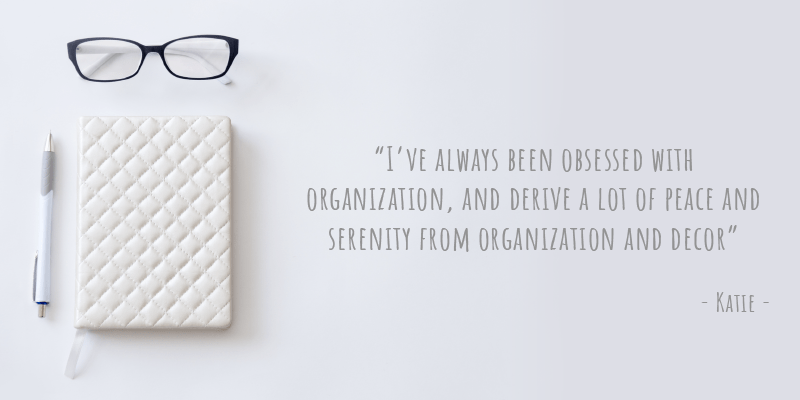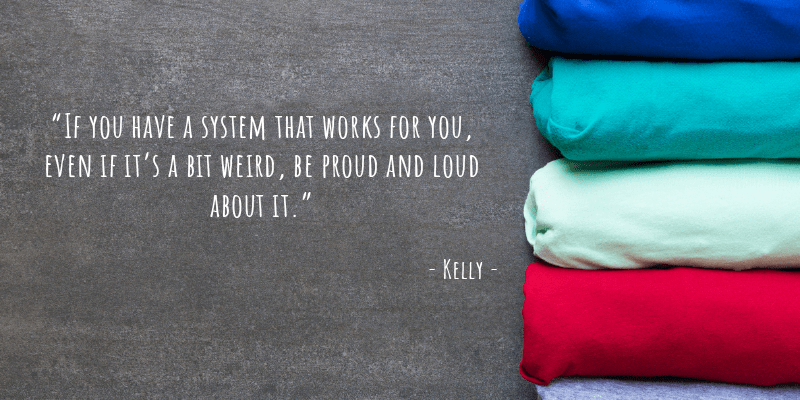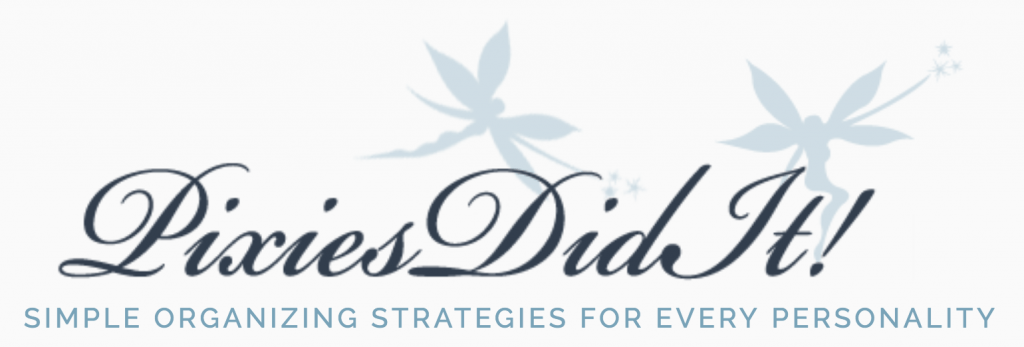The Original Pixies: A Sit-Down with Kelly and Katie
Kelly and Katie turned a home organizing business into a way of life using personality types and customizable organizational advice. Read on to find out more about what made PixiesDidIt a household name (pun intended), as we sit down with the two original pixies and discuss the ins and outs of their particular brand of ‘magic’.
Q: What was it that drew you to creating PixiesDidIt? Was it personal experience, seeing how friends dealt with (or didn’t deal with) organization?
Kelly– This answer is twofold. I’ve always been obsessed with organization, and derive a lot of peace and serenity from organization and decor. Growing up, my family was organized but cluttered. I always knew I was a little different. For example, growing up, we had bookshelves in every room in the house. In my house, I have one, maybe two. My own desire for tidiness and structure really came into being from that childhood environment.
Katie– It had absolutely NOTHING to do with organization! I could see how frustrated Kelly was in the finance world and so came up with a name for our fictional, pie in the sky business. PixiesDidIt (a combination of Katie Did It and our family nickname of “Pixies”) was the name I came up with. I rented the domain and gave it to Kelly for her birthday. Kelly thought I was crazy, and frankly I never thought she’d take me up on the idea, but fast forward six years later and the stars aligned and we started brainstorming ideas of what we could do together.

Q: Where did you get the idea to use personality types to help people get organized (finally)? Brilliant!
Kelly– My mom went back to school when I was in junior high and discovered personality types. She had everyone in the family take the Myers Briggs test, so that we all knew each other’s type. This exercise gave my family a common language to discuss differences, and explained a lot about each other. We would go skiing and my parents would buy cheese and pâté and I really hated the pâté. And my whole fam would cut the cheese with the same knife as they cut the pâté. It drove me crazy. I always knew I was different— not weird, just different.
Katie– I’ve always struggled with organization in my own life. I’m brilliant with other people’s messes, but not my own. And after Kelly’s attempt to help me failed, I just thought it was because she wasn’t a professional. Then I hired a professional and their attempt failed too. It wasn’t until we were roped into helping our hapless brother (who has an almost identical personality type to my own) clean up his apocalypse-level apartment mess— so his girlfriend (now wife) would move in with him— that we started to see that personality type was the missing piece in the home organization puzzle.
Q: Burning Question: How do Classic Structures need help organization-wise?
Kelly– Sometimes they get real busy. I have a lot of clients who are busy professionals, so I’m coming in doing the work they don’t have time for — number one. Second, sometimes Classic Structures are living with people who are not like them. The number one obstacle for staying organized is living with other people– especially true for Classic Structures. The second obstacle is having kids. In addition, they often expect everyone to organize like them. The way they like things makes things difficult and hard for other types. Take retrieval, for example. How it looks is an argument that people will have till the cows come home. Classic Structures want to purge, and want to purge everything right now. Other types usually resist that, hence the fighting. Another piece they struggle with is having five step rather than one step solutions to things. Other types will naturally struggle to follow and maintain five step solutions. Our job is to open their eyes to the fact that there are other ways to organize. I’m a classic freedom. My coat closet was way overstuffed and I finally put hooks up on the walls in the hallway, rather than stuff all the coats out of sight in the closet (classic Classic Structure move, right there.) If I have to bodycheck the door to close it, retrieval is impossible. It’s a little less stressful to have ‘visual clutter’ than have a cluttered closet you can’t close. A little visual chaos is better than zero chance of retrieval, and that is something Classic Structures struggle to accept.
Katie– They just need help learning how to relax! Those people do NOT know how to put their ‘To Do’ list down and live a little! I’m amazed that I have any friends who are Classics, and— oh right, I don’t actually! One of them’s my sister and she has to be my friend or my mother would disown us, and the other is a family friend who probably lets me hang out in her world because of my sister.
Q: There is the book, and then there is actually DOING the thing. Any tips on how to actually
motivate oneself to put these great suggestions into practice?
Kelly- I would start with the entryway – we start the book there. First impression. If that’s organized, you’re all set to begin organizing the rest of the house. Think about all the papers and keys, etc. and how you can best organize those. Because you’re most stressed when you’re coming and going (transitions), if you create systems around your natural habits, it allows you to tackle bigger obstacles. Take it room by room, and do the home office next. Everyone should have some form of a cubby. Every place with more than a couple people is a household and households need order and structure.
Katie- That’s the killer for types like mine — Organic Freedoms and Smart Freedoms. We don’t have built in ‘To Do’ list motivation like Classics, Organic Structures, and Smart Structures. Funs have a similar problem, but the practical, detail-oriented part of their brains tends to not be able to take the mess a lot sooner than my type. Deadlines, like throwing a party, are the best motivator for getting started. I’ve recently learned that I have to move in two months and all of a sudden I’m getting the mess under control so it doesn’t seem so overwhelming to move. It has been doing more for the organization of my house than all the parties in the world. It will be perfect and then we’ll have to move! But having things somewhat organized beforehand will make the move a lot easier.
Q: What is your favorite Pixie Principle? Why?
Kelly- One step solution. Getting things as close to one step as possible. Even someone like me — it helps guide you to organize any situation, no matter what your personality type. For example, if you are stacking heavy pans, think about the one step principle. It really does help people. It could help YOU organise things so that they are easier to retrieve — one of the other core principles. It takes me eight hours to organize a Manhattan kitchen. Yes, that’s right. Because finding a one step solution involves testing and finding things, pulling everything out, then putting it back together like a jigsaw puzzle. This is one of the most important principles, because it helps you organize anything and everything.
Katie- No shame, no blame! And um, that’s because I’m the messy one who has been shamed her whole life by her messy bedroom, then messy office, etc. And who ever heard of a messy organizer? But I’ve spent a lifetime apologizing for who I am and it’s more exhausting than just accepting that these are my tendencies and I’m always going to have more of a struggle than someone who isn’t my type. Seriously, mine has the most trouble! But that’s the thing, my life doesn’t always look tidy, but I’m actually pretty organized, as crazy as that might seem.

Q: No Shame, No Blame- I love how Pixie advice for home organization can also be applied to life advice for living. Can you talk a bit about the overlap?
Kelly– If you have a system that works for you, even if it’s a bit weird, be proud and loud about it. I always give this example. When my sister really does not want to forget something, she’ll write it ON HER HAND. I’ve always thought that was so unprofessional and juvenile. I used to be a hedge fund manager. One time, after we’d just started the company, I was watching CNBC and Richard Branson was on. He had something written on one of his hands. One of the interviewers made a joke and Richard Branson just looked at it and went on with the interview. At the end, they followed up with some judgement about it and Branson was very nonchalant. ”It’s my backup system,” he said. The journalist asked why he didn’t just write it on a napkin. And Branson said he would have lost the napkin. Just like that. I’d love to give people the same nonchalant self-awareness through figuring out their type and employing the Pixie principles. Empowering them, helping them be productive and successful. I wish people would stand up for themselves more. I myself am obsessed with lists but if you’re not a classic, you are in the minority? Nonsense! If you have a system that works and that helps you be successful, GO FOR IT!
Katie- An organized home is an organized mind. That’s true for all types. Even Kelly might not believe this and I rarely admit it, but the messier my house is, the more discombobulated I feel. The difference between me and tidier types is that I can live with it a lot longer. But eventually it’s going to bother everyone, regardless of type. Sometimes at the end of the day I’ll make my bed because it feels nice to get into a made bed…but in the morning? Frankly I used to forget to make my bed, because the minute I left that room I stopped thinking about it. Out of sight, out of mind for me. But here’s something that’s true for all facets of life — each new day, each new hour, minute, second is an opportunity to make a change — whether that’s deciding not to eat that piece of cake, or deciding to make your bed, or throw away that junk mail — and even if you failed yesterday, you can try again tomorrow, or in the next hour, minute, second — right now!
Q: What are each of your types?
Kelly- Classic Freedom. But do keep in mind that these are guides, and not dictums. If you feel like you’re more in between two different types, that’s fine with us. There is a gray area, definitely. That’s why we encourage you to look at all our advice — not just the advice prescribed for your particular type.
Katie- I’m an Organic Freedom. Literally the complete organizational opposite of Kelly! And the messiest!
Q: You give suggestions on how to purge as comfortably as possible. Is this gentle but firm approach the key to your success with clients?
Kelly- Yeah. I do think so, because a lot of organics and smarts often don’t hire organizers but eventually they end up being desperate to hire those people. Why get to that point when there is a way to do it that works with who you are? People kind of shut down when ‘home organizers’ are brought up because they don’t want to have to throw away items they’re attached to. They read Marie Kondo and feel uninspired and like that’s impossible. If you can separate yourself physically from these things with a ‘later box’ then all of a sudden you eventually stop thinking about it. Or sometimes it happens where you wish you hadn’t gotten rid of something. Really when people get snowed under is during life transitions. Storage facilities can be life savers. Give yourself three months. A year. Whatever you need. Time helps bring the cream to the top, and solidify priorities. If the items are sitting in the living room — make some distance by storing them elsewhere.
People like to hold onto things, which can spark disagreements with a partner. Half the time we are ‘marriage counselors’, because that’s often why we’re brought in. We have a client who has different views than their partner on having more kiddos and keeping the baby stuff, when the other person wasn’t on the same page. When two clients are on different pages, you’re acting like a marriage counselor. That’s definitely one of the times we get the most resistance from clients, when they’re not seeing eye to eye.
Katie- It’s definitely one of the things that sets us apart from other organizers. For half the types out there, throwing stuff out is incredibly difficult. Kelly and I still personally struggle with this. Kelly has cried over letting go of a cheap piece of furniture that lived in our beloved grandparents’ house. And we have a gentle approach to letting go of stuff that’s a secret— you’ll have to pore over our website or buy our book to find out! But here’s the gist — Slowly. Over time. It still might hurt in the end, but after it’s gone you’ll never doubt that you did the right thing.
